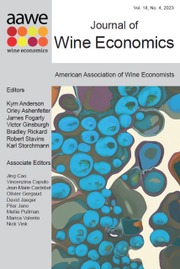Article contents
Wine Descriptions Provide Information: A Text Analysis
Published online by Cambridge University Press: 06 April 2020
Abstract
I use a computational linguistic algorithm to measure the topics covered in textual descriptions of wine. I ask whether there is information in the text that consumers value. Wine is a prominent example of an experience good. There is substantial product differentiation in the market, and consumers only have limited information on the utility they will receive when consumed. Thus, information is expected to be valuable. Evaluating descriptions of wine produced across the United States, I use a hedonic price regression to explore whether the descriptions provide any new information not already available to the consumer. Initial results suggest that text descriptions are shown to lose their explanatory value when varietal and numerical ratings are included as controls. I then show that once the varietal, region, and numerical ratings are adequately controlled for, there is information in the descriptions that consumers value. (JEL Classifications: C81, D83, L15)
- Type
- Articles
- Information
- Copyright
- Copyright © American Association of Wine Economists, 2020
Footnotes
I appreciate comments from Orley Ashenfelter, Josh Hall, Brad Humphreys, Adam Nowak, and seminar participants at West Virginia University and the conference participants of the American Association of Wine Economists. I also appreciate the helpful comments of an anonymous referee.
References
- 13
- Cited by


